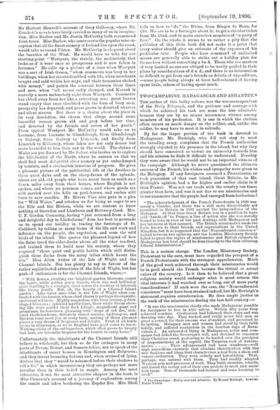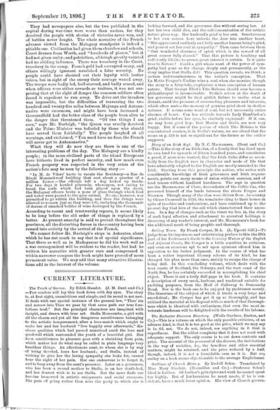TWO CAMPAIGNS: MADAGASCAR AND ASHANTEE.*
THE author of this bulky volume was the war-correspondent of the Daily Telegraph, and the patience and courage with which he achieved his task are none the less admirable because they are by no means uncommon virtues among members of his profession. It is one in which the civilian often incurs as much danger as the soldier, and, unlike the- soldier, he may have to meet it in solitude.
By far the larger portion of the book is devoted to Madagascar. Mr. Burleigh, who did not stay to meet the invading army, complains that the French authorities strongly objected to his presence in the island, but why they should have conceived so violent an animosity towards him and his mission he finds it difficult to understand. Possibly they were aware that he would not be an impartial witness of the campaign. Although be never questioned the ultimate success of the French, his wishes and sympathy were given to the Malagasy. If any foreigners assumed a Protectorate, or took possession of that vast island, Great Britain, in Mr. Burleigh's opinion, had a far higher and earlier claim to it than France. Was not our trade with the country ten times greater than hers, and was it not due to our missionaries and to our commerce that the people had emerged from barbarism I- " The acknowledgment of the French Protectorate in 1890 was surely a blunder, and there was a still more discreditable act permitted in Britain in 1S85 against the independence of the Malagasy. At that time Great Britain was in a position to have said hands off' to France, a line of action also she was morally bound to take in view of her past dealings with Madagascar and her interests at that moment. The British missionaries made the facts known to their friends and organisations in the United Kingdom, but it so happened that the ' Nonconformist conscience halted between two opinions, and the London Missionary Society failed to press the rights of missionaries and British subjects in. Madagascar lest hurt should be done thereby to the then tottering- Liberal Administration."
This is a serious charge. The London Missionary Society, Protestant to the core, must have regarded the prospect of a French Protectorate with the strongest apprehension. Much of the good work achieved through their missionaries would be in peril should the French become the virtual or actual rulers of the country. Is it then to be believed that a great religions society would endanger what it must esteem the vital interests it had watched over so long, out of mere party considerations P If such were the case, the "Nonconformist conscience " must have been strained indeed, but Mr. Burleigh's • statement requires corroboration. He does ample justice to the work of the missionaries during the last half-century:-
"It was the missionaries chiefly who made Madagascar possible for foreigners to live in with safety. Within fifty years they achieved wonders. Civilisation had followed their steps and was dawning into day. They worked, and verily never had men so great a reward, for their success was abundant, and promised to be lasting. Malagasy men and women had stood by their faith boldly, and suffered martyrdom in the heathen days of Rana- valona L An unheard-of thing in Madagascar, noble and com- moner had defied the Sovereign's will, and declined to renounce their Christian creed, preferring to be hurled over the precipice of Ampamarinana at the capital, the Tarpeian rock of Antana-
narivo Their advancement had been wondrous—well nigh marvellous—towards that absolute identification with the , new fashions and ideas that characterises a real from a shim and veneer civilisation. They were orderly and law-abiding. That, perhaps, was natural with them. They had readily adopted Western arts and processes of work. They built churches, schools, and found the money out of their own pockets to erect and main- tain them. Tens of thousands had learned and were learning to read."
• Two Campaigns; Madag•iscar and Ashanti% By Bennet Burleigh. Loudon Fisher Unwin.
They had newspapers also, but the two published in the capital during war-time were worse than useless, for they deceived the people with stories of victories never won, and of battles never fought. The whole narrative of the French advance viewed from the Malagasy standpoint is indeed a pitiable one. Civilisation had given them churches and schools, Court dresses from Worth, and "hundreds of pianos," but it had not given unity ; and patriotism, although greatly vaunted had no abiding influence. There was treachery in the Court, treachery in the camp. French gold had corrupted many, and others willingly ignorant nourished a false security. No people could have shouted out their loyalty with lustier voices, but in sight of the enemy their courage waned away. The troops were badly led, half-starved, and badly armed, and when officers were either cowards or traitors, it was not sur- prising that at the sight of danger the common soldiers often found it expedient to run away. To drive out the invaders was impossible, but the difficulties of traversing the two hundred and twenty-five miles between Majunga and Antana- narivo were enormous, and might have been increased a thousandfold had the better class of the people been alive to the danger that threatened them. " Of two things I am sure," says Mr. Barleigh, "the Queen was cruelly deceived and the Prime Minister was befooled by those who should have served them faithfully." The people laughed at all warnings, and exclaimed, "Yon need have no fear, the French will never get to Antananarivo."
What they will do now they are there is one of the interesting problems of the day. The Malagasy are a kindly people ; in the more civilised parts of the island Europeans have hitherto lived in perfect security, and how much even French property was respected in the very crisis of the nation's fate may be seen by the following story :—
" In M. de Vilers' haste to vacate the Residency—a Rue de Rivoli Mansard-roof building that cost about a quarter of a million francs —the officials left a dog locked up inside. For two days it howled piteously, whereupon, not caring to break the seals which had been placed upon the doors, the Malagasy officers broke a pane of glass through which food and water were passed to the poor animal. No one, however, was permitted to go within the building, and thus the things were allowed to remain juet as they were left, including the thousands of dozens of smashed bottles of wine destroyed by the French.
According to recent and trustworthy reports, it seems likely to be long before the old order of things is replaced by a better. At present anarchy is said to prevail throughout the provinces, all the disturbing forces in the country having been roused into activity by the arrival of the French.
We cannot follow Mr. Burleigh's steps in Ashantee, about which be has not much to say that is of special significance.
That there as well as in Madagascar he did his work well as a war correspondent will be evident to the reader, but had he written his narrative with greater care and compressed it within narrower compass the book might have proved of more permanent value. We may add that many attractive illustra- tions add to the interest of the volume.



































 Previous page
Previous page